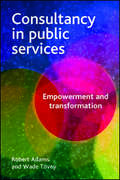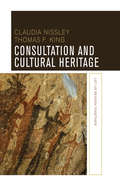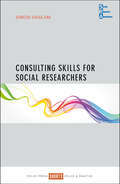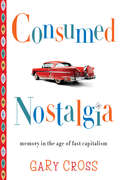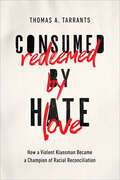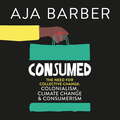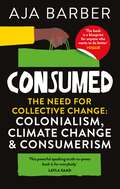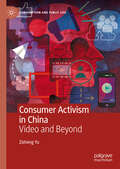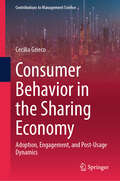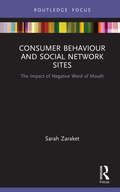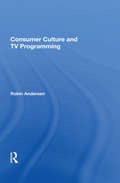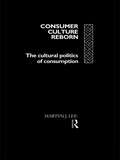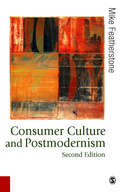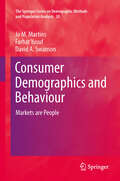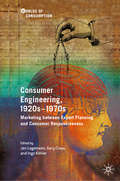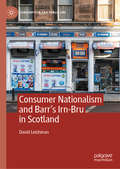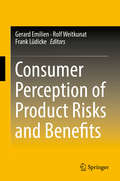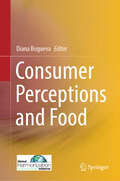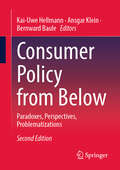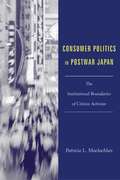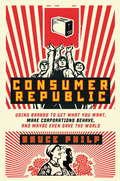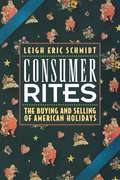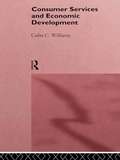- Table View
- List View
Consultancy in Public Services: Empowerment and Transformation
by Robert Adams Wade ToveyBased on the authors' twenty-five year experience of consultancy in the public services, this book develops an empowering approach to thinking about and doing consultancy with public services. It challenges the traditional view that the consultants are brought in as experts and instead examines ways of using consultancy to empower staff, patients, service users and members of the public, so that they can take part in developing, changing, innovating and ultimately transforming these services. The book includes chapters explaining consultancy, on preparing bids, on negotiations and on the importance of assessment and review which are geared towards the needs of those working in public and third sectors, either as or with consultants. It includes a glossary, abbreviations, helpful contacts and websites which are valuable for quick reference and to aid further understanding.
Consultation and Cultural Heritage: Let Us Reason Together
by Claudia Nissley Thomas F KingThis pragmatic guide to consultation in cultural heritage and environmental impact management distills decades of experience by two of the leading figures in this area. Claudia Nissley and Tom King reject the idea that consulting with communities and other stakeholders is merely checking off a box on the list of tasks required to implement a project. Instead, they show government agencies and project sponsors how to find the relevant parties, to discuss the project in an open and continuous fashion, to consider alternative strategies, and to seek agreement that meets everyone’s needs. The authors also provide useful guidance to community leaders and other stakeholders to represent their interests in the consultation process. Complete with practical suggestions and cases of successful (and less successful) consultation projects, Consultation and Cultural Heritage is a book that no one involved in this field should be without.
Consulting Skills for Social Researchers (Social Research Association Shorts)
by Simon HaslamConsulting skills help researchers frame and define research projects, manage the social research process, engage with stakeholders and influence change. This practitioner-oriented text is the first to help social researchers and those active in the social research sector develop these skills. Drawing from the International Council of Management Consulting Institutes’ consulting competence framework, it will aid understanding of effective consulting skills in the UK and international social research community and will be invaluable for all those commissioning, managing and conducting social research.
Consumed Nostalgia
by Gary CrossNostalgia isn't what it used to be. For many of us, modern memory is shaped less by a longing for the social customs and practices of the past, or family heirlooms handed down over generations, and more by childhood encounters with ephemeral commercial goods and media moments. This phenomenon has given rise to communities of nostalgia built around narrow age groups whose members remain loyal to the toys, television, and music of their youth and return to the theme parks and pasttimes of their upbringing, hoping to reclaim that feeling of childhood wonder or teenage freedom. While the romantic recollection of objects and experiences is not new, consumed nostalgia took definite shape in the 1970s, spurred by an increase in the turnover of consumer goods, the commercialization of childhood, and the skillful marketing of nostalgia. Gary Cross immerses readers in this fascinating and often delightful history, and talks to collectors, car afficionados, and others to unpack the cultural dynamics that turn pop tunes into oldies and childhood toys into valuable commodities. He compares the limited appeal of heritage sites such as Colonial Williamsburg to the perpetually attractive power of a Disney theme park and reveals how consumed nostalgia sometimes interferes with our ability to cope with change. Today nostalgia can be owned, collected, and easily accessed, making it less elusive than in the past, but its commercialization has turned meaning into a commodity, accentuating escape, distorting memory, and complicating some of the positive goals of recollection. By unmasking the fascinating, idiosyncratic character of modern nostalgia, Cross helps us remember the rituals of recall that extend beyond bought things and experiences.
Consumed Nostalgia: Memory in the Age of Fast Capitalism
by Gary CrossNostalgia isn't what it used to be. For many of us, modern memory is shaped less by a longing for the social customs and practices of the past or for family heirlooms handed down over generations and more by childhood encounters with ephemeral commercial goods and fleeting media moments in our age of fast capitalism. This phenomenon has given rise to communities of nostalgia whose members remain loyal to the toys, television, and music of their youth. They return to the theme parks and pastimes of their upbringing, hoping to reclaim that feeling of childhood wonder or teenage freedom. Consumed nostalgia took definite shape in the 1970s, spurred by an increase in the turnover of consumer goods, the commercialization of childhood, and the skillful marketing of nostalgia. Gary Cross immerses readers in this fascinating and often delightful history, unpacking the cultural dynamics that turn pop tunes into oldies and childhood toys into valuable commodities. He compares the limited appeal of heritage sites such as Colonial Williamsburg to the perpetually attractive power of a Disney theme park and reveals how consumed nostalgia shapes how we cope with accelerating change. Today nostalgia can be owned, collected, and easily accessed, making it less elusive and often more fun than in the past, but its commercialization has sometimes limited memory and complicated the positive goals of recollection. By unmasking the fascinating, idiosyncratic character of modern nostalgia, Cross helps us better understand the rituals of recall in an age of fast capitalism.
Consumed by Hate, Redeemed by Love: How a Violent Klansman Became a Champion of Racial Reconciliation
by Thomas A. Tarrants"Riveting, inspiring, at times hard to believe but utterly true...it gives some measure of hope in these rancorous times." -- John GrishamAs an ordinary high school student in the 1960s, Tom Tarrants became deeply unsettled by the social upheaval of the era. In response, he turned for answers to extremist ideology and was soon utterly radicalized. Before long, he became involved in the reign of terror spread by Mississippi's dreaded White Knights of the Ku Klux Klan, described by the FBI as the most violent right-wing terrorist organization in America.In 1969, while attempting to bomb the home of a Jewish leader in Meridian, Mississippi, Tom was ambushed by law enforcement and shot multiple times during a high-speed chase. Nearly dead from his wounds, he was arrested and sentenced to thirty years in the Mississippi State Penitentiary at Parchman Farm. Unrepentant, Tom and two other inmates made a daring escape from Parchman yet were tracked down by an FBI SWAT team and apprehended in hail of bullets that killed one of the convicts. Tom spent the next three years alone in a six-foot-by-nine-foot cell. There he began a search for truth that led him to the Bible and a reading of the gospels, resulting in his conversion to Jesus Christ and liberation from the grip of racial hatred and violence.Astounded by the change in Tom, many of the very people who worked to put him behind bars began advocating for his release. After serving eight years of a 35-year sentence, Tom left prison. He attended college, moved to Washington, DC, and became copastor of a racially mixed church. He went on to earn a doctorate and became the president of the C. S. Lewis Institute, where he devoted himself to helping others become wholehearted followers of Jesus.A dramatic story of radical transformation, Consumed by Hate, Redeemed by Love demonstrates that hope is not lost even in the most tumultuous of times, even those similar to our own."As a kid in Mississippi in the late 1960's, I remember the men of our church discussing the Klan's bombing campaign against the Jews. The men did not disapprove. Later, I would use this fascinating chapter of civil rights history as the backdrop for my novel The Chamber. Now, one of the bombers, Thomas Tarrants, tells the real story in this remarkable memoir. It is riveting, inspiring, at times hard to believe but utterly true, and it gives some measure of hope in these rancorous times." --John Grisham"Dramatic...Simply astonishing...Essential reading for these times. If you want to understand how the evil of extremist thought works--and how the gospel of God&’s grace can overcome it--read this book." --Mark Batterson, New York Times bestselling author of The Circle Maker, lead pastor of National Community Church"Amazing...Gives hope for what God can do." --Dr. John Perkins, president emeritus, John Perkins Foundation; co-founder emeritus, Christian Community Development Association"A riveting narrative." --Russell Moore, president, the Ethics & Religious Liberty Commission of the Southern Baptist Convention"This gripping and inspiring story is as timely as today&’s headlines....Put on your seatbelt and prepare to enter into one of the most extraordinary true stories you&’ll ever encounter!" --Lee Strobel, best-selling author of The Case for Christ and The Case for Grace"Reveals how easily a political ideology can grow into a radical, extreme, life-taking worldview, all the while masquerading for some supposed form of a 'Christian' faith....A powerful story!" --Eric C. Redmond, associate professor of Bible, Moody Bible Institute, Chicago
Consumed: How Markets Corrupt Children, Infantilize Adults, and Swallow Citizens Whole
by Benjamin R. BarberHow advertising and marketing seek to keep adults thinking like children and seek to advertise to children as if they are able to make choices as independent consumers.
Consumed: The need for collective change; colonialism, climate change & consumerism
by Aja BarberAja Barber wants change. In the 'learning' first half of the book, she will expose you to the endemic injustices in our consumer industries and the uncomfortable history of the textile industry; one which brokered slavery, racism and today's wealth inequality. And how these oppressive systems have bled into the fashion industry and its lack of diversity and equality. She will also reveal how we spend our money and whose pockets it goes into and whose it doesn't (clue: the people who do the actual work) and will tell her story of how she came to learn the truth.In the second 'unlearning' half of the book, she will help you to understand the uncomfortable truth behind why you consume the way you do. She asks you to confront the sense of lack you have, the feeling that you are never quite enough and the reasons why you fill the aching void with consumption rather than compassion. And she makes you challenge this power disparity, and take back ownership of it. The less you buy into the consumer culture the more power you have.CONSUMED will teach you how to be a citizen not a consumer.(p) 2021 Octopus Publishing Group
Consumed: The need for collective change; colonialism, climate change & consumerism
by Aja Barber'Consumed takes us through the hideously complex topic of fashion and sustainability, from its knotty colonial roots to what everyday people can do to uproot those systems, today.' - Yassmin Abdel-Magied 'SUCH integrity. Aja is no bullsh*t.' - Florence Given Aja Barber wants change. In the 'learning' first half of the book, she will expose you to the endemic injustices in our consumer industries and the uncomfortable history of the textile industry; one which brokered slavery, racism and today's wealth inequality. And how these oppressive systems have bled into the fashion industry and its lack of diversity and equality. She will also reveal how we spend our money and whose pockets it goes into and whose it doesn't (clue: the people who do the actual work) and will tell her story of how she came to learn the truth.In the second 'unlearning' half of the book, she will help you to understand the uncomfortable truth behind why you consume the way you do. She asks you to confront the sense of lack you have, the feeling that you are never quite enough and the reasons why you fill the aching void with consumption rather than compassion. And she makes you challenge this power disparity, and take back ownership of it. The less you buy into the consumer culture the more power you have.CONSUMED will teach you how to be a citizen not a consumer. 'An absolute must-read for any person who wears clothes.' - Orsola de Castro 'A hugely compelling exploration of a culture of exploitation and how, together, we can end it.' - Gina Martin 'Barber's isn't just a voice we should listen to - it is a voice we MUST listen to.' - Clementine Ford 'If you buy one book about sustainable fashion, make it this one. Consumed is an urgent call to action to demand a fashion system that is actually fair for both people and planet, not just Big Fashion billionaires. I adore Aja and I love this brilliant book.' - Venetia La Manna
Consumer Activism in China: Video and Beyond (Consumption and Public Life)
by Zizheng YuThis book investigates the origins, dynamics and impacts of the different nuances of contemporary short video activism tactics, by merging theories from social movement studies and communication studies including grievances theories, a renewed understanding of the concept of repertoires of contention and a critical media practice approach. It situates this phenomenon in the long durée of consumer activism in both the Global North and the South and demonstrates how short video activism constitutes a vibrant new phase in the historical evolution of activism in the Chinese socio-political context. It will be of interest to students and scholars of social activism, social movement studies, consumer culture studies and media practice.
Consumer Behavior in the Sharing Economy: Adoption, Engagement, and Post-Usage Dynamics (Contributions to Management Science)
by Cecilia GriecoThe book examines the essential aspects of consumer behavior within the sharing economy. This thorough analysis covers the pre-adoption, active usage, and post-adoption phases, offering a comprehensive view of the consumer journey. The research is based on an extensive literature review, highlighting key elements and emphasizing the consumer perspective through original quantitative and qualitative studies across various industries. Researchers will find the theoretical advancements and cutting-edge insights invaluable. Platform managers will gain a deeper understanding of consumer behavior, enabling them to refine strategies throughout the purchasing process. Marketing professors can use this book as a primary textbook or supplementary reading for their courses. Key topics include the drivers of adoption, trust issues, satisfaction, and user retention, along with theoretical frameworks that uniquely define the phenomenon of the sharing economy and the specificities of consumer behavior within this domain.
Consumer Behaviour and Social Network Sites: The Impact of Negative Word of Mouth (Routledge Focus on Business and Management)
by Sarah ZaraketThis book provides a solid understanding of electronic word of mouth (eWOM) by taking the reader through the process of information diffusion from rumour generation in times of traditional word of mouth (WOM) to negative social eWOM and examining how consumers process it. Consumer Behaviour and Social Network Sites tackles different themes relating to negative eWOM. Drawing on both intensive scientific research and professional examples, it bridges the gap between the academic and professional worlds. The book contrasts negative social eWOM to traditional WOM while discussing the specificities of different social networking sites in diffusing such information. It looks at why and how consumers decide to create, share and react to negative social eWOM, suggesting that there are more reasons than are commonly presumed for consumers to articulate themselves on these platforms. It also provides an appreciation of web users' behaviours with regards to negative social eWOM and how it can alter their decision-making journey. The book concludes with several strategies and key takeaways to deal with and prevent negative social eWOM. Most books on WOM are purely professional and lack the theoretical contextualization of the issue. Moreover, they often provide insights on brand-to-consumer conversation but not consumer-to-consumer (C2C) communication. This short book provides marketing academics, students and practitioners with an important insight into these C2C communications that can potentially be harmful to brands.
Consumer Culture And Tv Programming (Critical Studies In Communication And In The Cultural Industries)
by Robin K AndersenProduct placement is now an integral part of what is considered the highest-quality fiction programming on television. Throughout the history of television, until now, direct product placement within fiction has not been a significant marketing strategy. This broadcasting/marketing configuration marks a another definitive step in the history of the commercialization of television. This book is an exploration of the interconnections between media economics and communication discourse. The recessionary, highly competitive economic environment of the 1980s, which affected networks, independent broadcasting, and the media industry in general, has been widely noted in the business pages of the national press. But the dramatic effects on programming wrought by the financial strategies of this period are yet to be understood. Marketing factors account for the heightened emphasis on programming environment during the 1980s. But what are the full implications of the practice of audience marketing and the creation of appropriate programming environments?
Consumer Culture Reborn: The Cultural Politics of Consumption
by Martyn J. LeeFirst published in 1993. Routledge is an imprint of Taylor & Francis, an informa company.
Consumer Culture and Postmodernism (Published in association with Theory, Culture & Society #6)
by Mike FeatherstoneThe first edition of this contemporary classic can claim to have put 'consumer culture' on the map, certainly in relation to postmodernism. This expanded new edition includes: a fully revised preface that explores the developments in consumer culture since the first edition a major new chapter on 'Modernity and the Cultural Question' an update on postmodernism and the development of contemporary theory after postmodernism an account of multiple and alternative modernities the challenges of consumer culture in Japan and China. The result is a book that shakes the boundaries of debate, from one of the foremost writers on culture and postmodernism of the present day.
Consumer Demographics and Behaviour: Markets are People (The Springer Series on Demographic Methods and Population Analysis #30)
by David A. Swanson Farhat Yusuf Jo M. MartinsThis is the book that market strategists have been waiting for to position themselves in global markets and take advantage of the opportunities that demographic bonuses and deficits offer to them and their products. It is also a book for teachers and students of consumer behaviour to grasp the importance of the life cycle as a framework that shapes the demand for goods and services determined by changes in social, economic and physical functioning. It gives insights into gendered consumer behaviour and cohort effects. It presents a range of views on consumer behaviour and how demographic perspectives enhance these perspectives. The book offers conceptual and analytical tools that can be used in the assessment of population characteristics as determinants of market size, composition and potential for a variety of products. It offers organising frameworks as well as empirical evidence of consumer behaviour in clusters of markets, with different rates of population growth and age distribution that affect consumers' priorities and demand for basic and progressive commodities. The book shows commonalities as well as differences in consumer behaviour arising from different cultures and social customs. It uses analytical tools that are explained and accessible to readers with a range of competences. It is a book that can give a better understanding of consumer behaviour and market opportunities to the practitioner. It can also be used for the instruction of students in demography, consumer behaviour and marketing.
Consumer Engineering, 1920s–1970s: Marketing between Expert Planning and Consumer Responsiveness (Worlds of Consumption)
by Gary Cross Jan Logemann Ingo KöhlerIn the middle of the twentieth century, a new class of marketing expert emerged beyond the familiar ad men of Madison Avenue. Working as commercial designers, consumer psychologists, sales managers, and market researchers, these professionals were self-defined “consumer engineers,” and their rise heralded a new era of marketing. To what extent did these efforts to engineer consumers shape consumption practices? And to what extent was the phenomenon itself a product of broader social and cultural forces? This collection considers consumer engineering in the context of the longer history of transatlantic marketing. Contributors offer case studies on the roles of individual consumer engineers on both sides of the Atlantic, the impact of such marketing practices on European economies during World War II and after, and the conflicted relationship between consumer activists and the ideas of consumer engineering. By connecting consumer engineering to a web of social processes in the twentieth century, this volume contributes to a reassessment of consumer history more broadly.
Consumer Nationalism and Barr’s Irn-Bru in Scotland: Iron Nation (Consumption and Public Life)
by David LeishmanThis book connects a detailed analysis of Irn-Bru’s brand identity over time to theories of national identity, consumer studies, and banal nationalism. It situates the commercial history of Barr’s Irn-Bru in a transnational context and shows how Irn-Bru has become a symbol of Scotland through processes of rewriting, reframing and institutionalized forgetting, linking the consumption of what began as a trans-national generic product to a specific national community. As such, Leishman presents a longitudinal, cross-disciplinary approach to analysing branding and advertising as multi-modal forms of discourse, in order to underline the role of commercial, non-state actors and popular consumerism in the phenomenon of banal nationalism. It will be of interest to students and scholars researching nationalism, consumption, and Scottish studies.
Consumer Perception of Product Risks and Benefits
by Gerard Emilien Rolf Weitkunat Frank LüdickeThis book reflects the current thinking and research on how consumers' perception of product risks and benefits affects their behavior. It provides the scientific, regulatory and industrial research community with a conceptual and methodological reference point for studies on consumer behavior and marketing. The contributions address various aspects of consumer psychology and behavior, risk perception and communication, marketing research strategies, as well as consumer product regulation. The book is divided into 4 parts: Product risks; Perception of product risks and benefits; Consumer behavi∨ Regulation and responsibility.
Consumer Perceptions and Food
by Diana BoguevaThis book is a timely overview of the various aspects of consumer perception related to food. This book explores consumer perceptions that are vital to marketers and often underlie the success or failure of products in the marketplace. Perception is the process of selecting, organizing, and interpreting sensations into a meaningful whole, and this book highlights how human perceptions are unique, highly subjective, and easily distorted. These perceptions are influenced by our senses—sight, hearing, taste, smell, and touch—as well as our beliefs, emotions, opinions, and experiences. This book states that this is related to food, and perceptions are also guided by beliefs, thoughts, emotions, feelings, and opinions about, or preferences, expectations, and knowledge of, and the sensory experience, the fear, and the relationships built between the consumers and the food over time. This book aims to further the understanding of the fundamental mechanisms which determine individual responses to existing and emerging food issues. This book provides insights into consumer behaviour (e.g. consumer decision making, promoting behaviour change), factors influencing consumers’ food and meal choices, confidence in the safety of food, perception of health-related messages and food laws and regulations, sustainable and responsible consumer behaviour (e.g. food waste), acceptability of new food alternatives, innovations and technologies, integrating consumer insight and communication challenges in cross-functional communications in innovation processes. "Consumer Perceptions and Food" delves into how these perceptions shape consumer behavior, from decision-making and behavior change to meal choices and confidence in food safety. It explores the impact of health-related messages, food laws, and regulations, and examines the acceptability of new food alternatives and technologies. The book also addresses the importance of sustainable and responsible consumer behavior, including food waste and ethical consumption. Through a rich array of insights, this book provides a deep understanding of the fundamental mechanisms that drive individual responses to food issues. It emphasizes the importance of mindful eating—making conscious food choices that benefit our health, the environment, and the planet. This involves considering the origins of our food, its production methods, and the broader impacts of our choices on public health and ecosystems. This book is a call to action for consumers to rethink their relationship with food, fostering deeper connections and appreciation for sustainable practices and ethical consumption. It is a crucial step in the ongoing journey of shaping the future of food, guided by informed and mindful consumers.
Consumer Policy from Below: Paradoxes, Perspectives, Problematizations
by Ansgar Klein Kai-Uwe Hellmann Bernward BauleSince its existence in the 1950s, consumer policy in Germany has been understood and pursued primarily as a bundle of actions and measures initiated and institutionalised by the state. In many cases, the state has also issued corresponding mandates and set up support models, which has created the impression that we are basically dealing with a 'consumer policy from above' imposed by macro-politics. Not that there have not been repeated attempts in the past decades to give impetus to consumer policy from the middle of civil society - often in the form of small citizens' initiatives. And in recent years in particular, a number of new consumer organisations have emerged which operate much closer to the grass roots. Nevertheless, the impression seems to have taken root among the large, government-related 'players' in the field, who have been in the 'business' for decades, not to mention government-internal consumer policy, that consumer policy concerns a policy field that is essentiallyordered by a collaboration of the state on the one hand, and consumer protection organisations representing all consumers equally on the other, while the many small consumer initiatives, not even started by individual committed consumers, regularly fall behind in comparison. This perspective refers largely to the view of and from the centre of politics. This volume is intended to go some way towards countering the institutionally prevailing impression that, in principle, there is only 'consumer policy from above' that is really effective and assertive.The translation was done with the help of artificial intelligence. A subsequent human revision was done primarily in terms of content.
Consumer Politics in Postwar Japan: The Institutional Boundaries of Citizen Activism (Studies Of The East Asian Institute (coup) Ser.)
by Patricia MaclachlanProviding comparisons to the United States and Britain, this book examines Japan's postwar consumer protection movement. Organized largely by and for housewives and spurred by major cases of price gouging and product contamination, the movement led to the passage of basic consumer protection legislation in 1968. Although much of the story concerns the famous "iron triangle" of big business, national bureaucrats, and conservative party politics, Maclachlan takes a broader perspective. She points to the importance of activity at the local level, the role of minority parties, the limited utility of the courts, and the place of lawyers and academics in providing access to power. These mild social strategies have resulted in a significant amount of consumer protection.
Consumer Republic
by Bruce PhilpConsumer Republic dares you to consider this: The power to save the world lies with the consumer. The foundation of Bruce Philp's message is this single, inarguable truth: Brands make corporations accountable. They are the only leverage the average consumer has with which to make a company behave itself. Expensive to create, essential to making money, and more public than anything else a corporation has or does, a brand is an enormously valuable and fragile asset to them. And we consumers have the power to make it worthless. As someone who has worked on the inside, Philp knows exactly how this power can be made to work for us. Through this book he will inspire you to make every dollar you spend count. To buy less, maybe, but demand better. To make better choices. And then to speak up when you're happy and when you're not. Pin every one of these acts to a brand, Consumer Republic promises, and corporations will be forced to cooperate in making our way of life sustainable. Abandon brands, and we'll surrender the marketplace to scoundrels. Take control of them, and we can save the world.From the Hardcover edition.
Consumer Rites: The Buying and Selling of American Holidays
by Leigh Eric SchmidtSlogans such as "Let's put Christ back into Christmas" or "Jesus is the Reason for the Season" hold an appeal to Christians who oppose the commercializing of events they hold sacred. However, through a close look at the rise of holidays in the United States, Leigh Schmidt show us that commercial appropriations of these occasions were as religious in form as they were secular. The rituals of America's holiday bazaar that emerged in the nineteenth century offered a luxuriant merger of the holy and the profane--a heady blend of fashion and faith, merchandising and gift-giving, profits and sentiments, all celebrations of a devout consumption. In this richly illustrated book, which captures both the blessings and ballyhoo of American holiday observances for the mid-eighteenth century through the twentieth, the author offers a reassessment of the "consumer rites" that various social critics have long decried for their spiritual emptiness and banal sentimentality.
Consumer Services and Economic Development
by Colin C. WilliamsConsumer Services have been viewed as parasitic activities, dependent on other sectors of the economy for their viability and vitality. Yet local economic policy is now looking towards consumer services to solve severe economic problems. The rapid expansion of the service sector is now a principal feature of contemporary global economic restructuri
